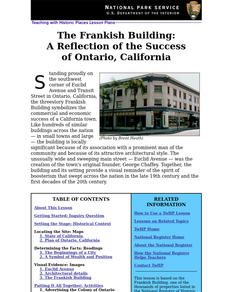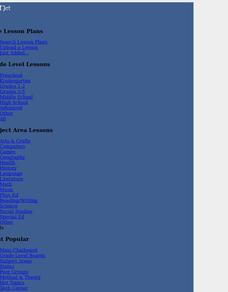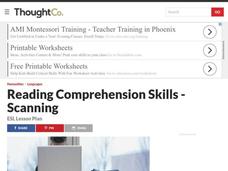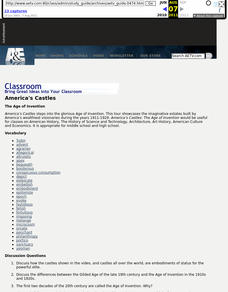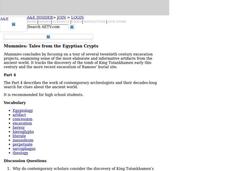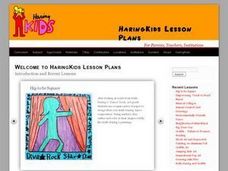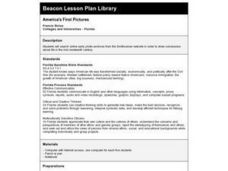Curated OER
The Frankish Building: A Reflection Of The Success of Ontario, California
Students evaluate the impact of the Chaffey brothers and Charles Frankish on Ontario, California, and compare their efforts with those of similarly important figures in their own community's history.
Teachers.net
Smoking and the Advertising Industry (Middle, other) SMOK_AD.DOC
Middle schoolers study advertising techniques and the effects of smoking on health.
Curated OER
Speaking Skills - Asking Questions
Students focuses on the question form and helping students gain skill while switching tenses in the question form. They improve speaking confidence when using quesion forms.
Curated OER
Reading Comprehension - Scanning
Learners use scanning as a comprehension skill when reading certain types of publications. They compare the reading technique used when reading in their mother language to those used when reading English.
Curated OER
America's Castles: The Age of Invention
Students tour the estates built by America's wealthiest visionaries during the years 1911-1929. They discuss the Age of Invention and the people associated with that age in US history.
Curated OER
Mummies: Tales from the Egyptian Crypts Part IV
Young scholars choose one or two of the artifacts found in King Tutankhamen's tomb and describe and analyze the artifact. Explain what it tells us about Tutankhamen's life and about ancient Egyptian culture.
Curated OER
Famous Black Americans
Students recognize famous Black Americans and their roles in America's society. They create a database and slideshow presenting famous Black Americans and relevant facts of their lives.
Curated OER
Practical Criticism
Students analyze the verbal devices through which poems make meaning; to compare one's personal interpretation of a poem with the personal interpretations of others; to develop standards of literary judgment.
Curated OER
Stonewall and Beyond:
High schoolers examine issues that surround the quest for gay/lesbian equal rights, explore bias and negative stereotyping in the media and their effect on how gays and lesbians are treated, examine their own biases, and express their...
Curated OER
Centennial: But Mom, I Have Nothing To Wear
Fourth graders examine the contributions of Native American Indians, explorers, and Utah's pioneers. They discuss ways in which clothing can communicate and help identify time periods, thoughts, and values.
Curated OER
Hurricanes
Students listen to a transcript of an interview about an upswing in hurricanes with Stanley Goldenberg, a researcher with the National Oceanographic and Atmospheric Administration. students participate in a series of discussion questions.
Curated OER
Dorothea Lange and the Relocation of Japanese Americans
Young scholars analyze a photograph and translate the analysis into words. They explain and explain the impact of governmental decisions made during a specific historical time period.
Curated OER
Saving Habitat
Learners pick an animal native to Maryland and research how populations of that animal might be affected by land use changes over the past thirty years. They predict population trends for the next thirty years.
Curated OER
Integrating Target Structures
Pupils read short essays on the characteristics of several cities. They discuss these characteristics focusing on the use of the passive and active voice in past tenses.
Curated OER
UMNH: Cultural Clutter - Tales In The Trash
Fourth graders list three or more types of evidence of prehistoric cultures that encouraged archaeologists to investigate the marshes around the Great Salt Lake. They also explain why it is important not to disturb archaeological remains.
Curated OER
"Lost Boys of Sudan" Lesson Plan - Lost Childhoods:
Learners analyze the connection between history and identity, explore what is gained and what is lost in learning a new culture, and develop a working definition of the word refugee.
Curated OER
"Big Enough" Lesson Plan
Middle schoolers gain awareness and knowledge about Dwarfism by watching and responding to a film.
Curated OER
Comparing Time Periods in U.S. History: The Ashford Project
Fifth graders use a "fact book" comparing periods in American history then students create a picture to illustrate their assigned periods. # # students use their pictures and concept maps to write expository paragraphs about their...
Curated OER
the International Criminal Court's History And Uses
Young scholars analyze and come to explain the history behind the formation of the International Criminal Court, along with the recent controversy facing the Court; and current crises that warrant the Court's attention.
Curated OER
Introduction to Keith Haring
Students experience a dance club-like environment one would find in Haring's 1980's. They dress in 80's clothes and learn break dancing moves. They relate the experience to Haring's artwork and explain his influences.
Curated OER
America's First Pictures
Fifth graders visit the Smithsonian website to search online for early photo archives about life in the mid-nineteenth century.
Curated OER
Looking Through Time
Second graders research their local history and create a books program.
Curated OER
Through the Years
Second graders read "The Hundred Penny Box" by Sharon Bell Mathis. They collect pennies and pictures for each year they have been alive. They use software and their scanned photographs to design an autobiography.
Curated OER
Touring My County
Second graders research important events that occurred in their counties for each year they have been alive. They, in groups, categorize these events and develop notes to be used in the writing of an autobiography.
Other popular searches
- Decades of the 20th Century
- Music Through the Decades
- Decades Centuries
- Decades Project
- Decades in America
- 20th Century Decades Project
- Music of the Decades
- Economic Decades
- Different Decades
- Decades History
- Us History Decades Project
- American Decades


